
Roundup: Emma Watson at the U.S. Open; Lakers Sign Christian Wood; Team USA Bounced Back at FIBA World Cup
Emma Watson went to the U.S. Open, the Lakers signed Christian Wood, Team USA blew out Italy at the FIBA World Cup and more in the Roundup.
1970-01-01 08:00
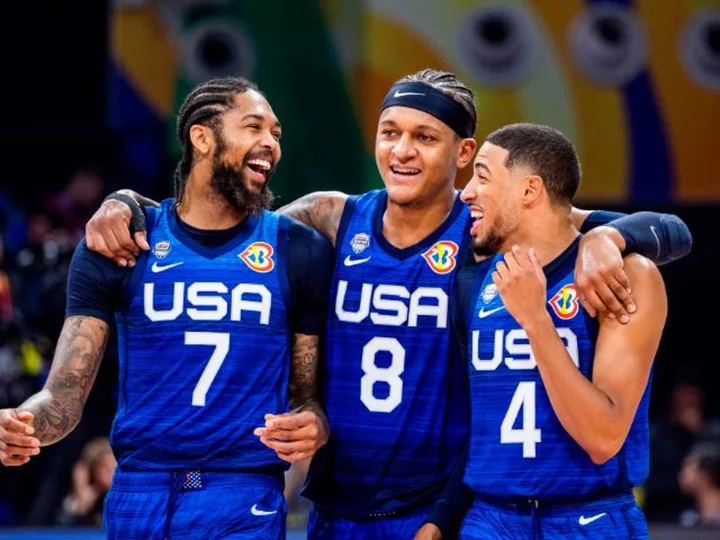
Team USA routs Italy, 100-63, to reach FIBA Basketball World Cup semifinals
Team USA bounced back from its shock defeat to Lithuania with a statement trouncing of Italy, 100-63, to reach the FIBA Basketball World Cup semifinals.
1970-01-01 08:00
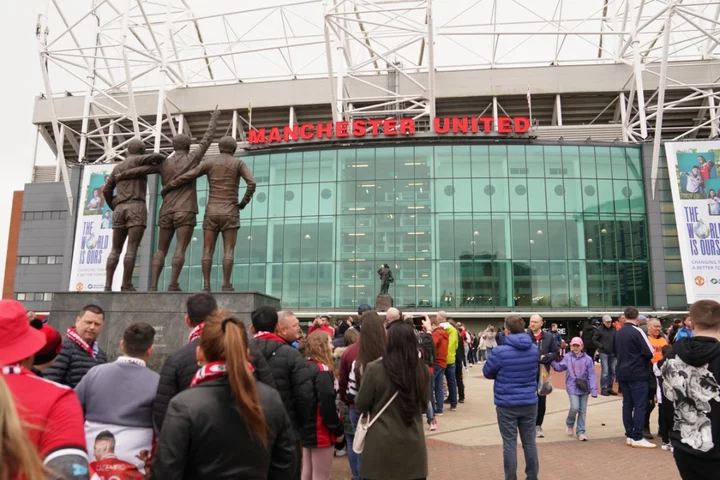
Manchester United share price crashes by £500m after report Glazers may not sell
Manchester United’s valuation on the New York Stock Exchange plummeted by more than £500million in the wake of a report that the Glazers have decided not to sell. Nine months ago the owners announced a full sale was among the options being considered as part of a strategic review at the Old Trafford club. Sheikh Jassim and Sir Jim Ratcliffe made offers to buy United, yet the interminable potential takeover process rumbles on as fans continue to protest against the Glazers. Hopes of a full sale were seemingly dashed when the Mail on Sunday reported that the owners are taking the club off the market and will try to sell again in 2025. That report led to more than £500m being knocked off United’s share price on Tuesday. After the New York Stock Exchange reopened following the Labor Day holiday, the price plummeted from 23.66 US dollars (£18.83) to 19.35 US dollars (£15.40) by close. United’s market capitalisation – the company’s worth on the stock market – was left at 3.15billion US dollars (£2.5billion) after the 18.22 per cent drop. Earlier this year the Glazer family reportedly valued United at £6bn. Read More Charity boss speaks out over ‘traumatic’ encounter with royal aide Ukraine war’s heaviest fight rages in east - follow live
1970-01-01 08:00
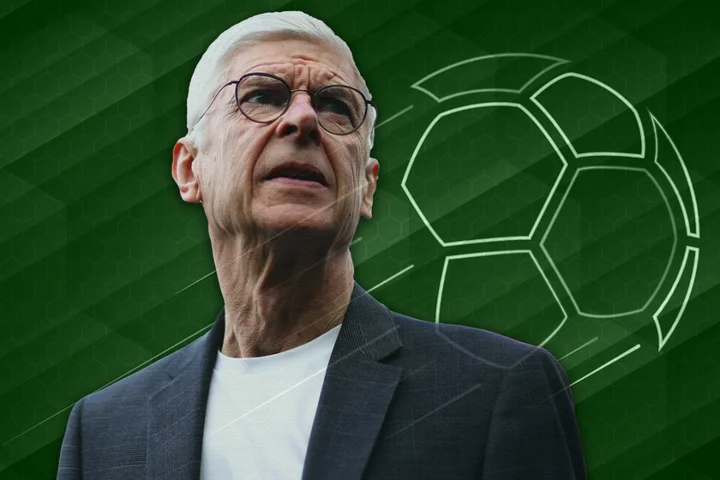
Arsene Wenger reveals his blueprint for the future of football
There are still moments when Arsene Wenger sits at his desk in Zurich – of course overlooking every type of pitch, from 11-a-side to beach football – and wonders about the scale of the task he has taken on. Perhaps facing Sir Alex Ferguson or Pep Guardiola was easier. “When you sit here and think, ‘I have to improve football in the world’, you realise that it’s not easy, you know," Wenger laughs, before gesturing to the pitches below. "I would rather say ‘give me a team and down there I can show you what I can do’. But once you sit here and say, 'how much, 211 countries? OK, thank you very much!’” And yet, as great as Wenger’s managerial legacy is, there are so many moments in speaking to him about his role as Fifa chief of global football development when it’s impossible not to wonder how much the wider game could have benefitted from his rare insight. “I can understand that as long as I was at Arsenal I didn't care too much about that because I had to win the next game," he says. "Once you have a global vision of world football, you realise something is not right.” Wenger has probably attracted most focus in the role for fronting the move for a biennial World Cup, but his real work – and a truly great responsibility – is raising the level of the sport across the planet so every country and every child has a chance. “I believe really football can change the world,” he said at the Fifa Women’s Football Convention in Sydney last month. “Not just on the football side, the human side. That’s the next step.” Wenger is sitting here on transfer deadline day explaining in a wide-ranging interview with the Independent exactly how. It is a particular challenge when he goes to countries like Cote d’Ivoire and the president tells him they haven’t had an official youth game in five years. “And here you have Yaya Toure, Didier Drogba, Kolo Toure, you know we have the players, it’s a football country,” Wenger says. “I always think there’s a little girl or a little boy who has a dream, has the talent and no opportunity.” It’s all the more frustrating for Wenger since there is now a strong argument that football is the most popular cultural pursuit the planet has ever seen, particularly with the way it spreads into the United States and India, all while developing huge money. Most of that, however, stays in one corner of the globe. “In Europe, it's all done and we are a little bit not conscious of the needs elsewhere, because in some countries there's no [football] education… it’s incredible. “Football is conquering the world at an unstoppable speed and at the moment there is a dysfunction between the audience and the practice in some countries.” In other words, there aren’t the resources to match the interest: the dream. Wenger talks about how the first steps to solving this are creating free centres of excellence for the best young talent and spreading out from there to create grassroots structures. Fifa is currently funding 25 academies, and the former Arsenal manager recently had the coaches involved at his office for the final preparations. Such is the nature of the discussion and the nature of his thinking, though, that an hour-long interview spreads into all manner of areas. They include: How football may have to “create striker schools” to solve a lack of goalscorers How modern academies offer high technical quality but have meant “we lose a bit of that freedom, that creativity” How pressing has affected that “The trend in some academies is to recreate park football” How football isn’t producing anywhere near as many good players as it could “Does the world produce enough good players? I think no” How this has led to an inflated transfer market, where “everybody thinks the same” Why countries like Croatia and Uruguay are so repeatedly successful How football is addressing these issues There’s then the vintage manner he offers profound insights about football, and seemingly simple lines that capture so much, just in sitting there talking about it. Employing Wenger to directly study the game only amplifies that, which is what he has spent the last few years doing since taking the job in 2019. “We analysed football in 205 countries and we found in half of the world there’s a deficit in education… which I mean as identification of talent, coaching programme, quality of coaching, quality of the competitions and integration in the first team. “What we basically found out by analysing the whole world is there’s a huge correlation between the quality of the educational system and the results in the first team. That was mathematics. “We proposed to each member association to help them to develop the education. Basically, if you have no education in life, you have no chance so my purpose was of course to change that.” Some of the challenges themselves come from what has been one of the most transformational factors in the modern game. That is the way a sequence of wealthy western European countries like France, Spain, Germany and now England have essentially industrialised talent production. Wenger himself points to how Clairefontaine-fashioned underage teams were thrashing England’s when he arrived at Arsenal in 1996, but that no longer happens. England has caught up. It’s put to him that the old line from journalist and former footballer Eamon Dunphy - that “dictatorships and poverty” produce good footballers - no longer applies. It is typical Wenger, though, that immediately leads to another fascinating path of discussion. “No, no, I would say it's quality of education. What has dropped in recent generations is that of course park football has disappeared and now the trend in some academies is to recreate again what happened before. The game itself is a good coach. “Why? Because, if I play in the park, I have to make decisions. If I’m shrewd enough to think why did that not come off, and have a right assessment, the next time I am in the same situation I am correct. We have lost that a little bit. And maybe today we are overcoaching a little bit sometimes, and we lose a bit that freedom, that creativity, that individual personalised training that happened before.” A classic example of what Wenger is talking about comes from one of the most famous goals of all time. In bearing down on Peter Shilton in the 1986 World Cup quarter-final, Diego Maradona remembered a previous occasion when the England goalkeeper went one way. So, at this moment of heightened tension and consequence, the Argentina great went the other way. The rest is history, but the evolution since has removed something from the game’s present. Wenger believes the greatest cost of the more homogenised academy system is with that fundamental of the game - putting the ball in the back of the net. Or, more specifically, he believes it has resulted in a decline in strikers that has inevitably brought a decline in classic centre-halves, too. READ MORE: ‘Would Messi still have been Messi?’ A lost generation of future footballers The hermetically sealed nature of modern academies has meant young players are not “educated for the fight” in the same way. “I think football has improved dramatically all over the world but some positions today are more difficult to find because maybe the evolution and the quality of the coaching has suppressed natural fighting qualities in positional play. “The emphasis has become more on quality of passing, quality of coaching. What you lost from the wild football is, if you go out now to a training session here, it will be built to start with passing, after that the quality of possession. “Before, the training pitches were not good, so you had to lift the ball to the striker. A striker had to fight to get the ball so, naturally, you develop qualities that, with the passing, you develop a little bit less. “If we go out there and play in the park, you think you have to score goals to win the game. Then you have to fight. “As well, the man-to-man marking has disappeared so it’s easier to get the ball. You are less confronted with fight. You see that in Germany. Since they play zonal they don’t produce strikers anymore. “If you look at the global evolution, we have moved away from defenders who only defend, from strikers who only attack, from midfielders where some defend and some attack, to be more demanding completely. Technically, today, the players in every position need to be better because of higher demands than 30 years ago. The pace is higher, the athletic side is higher. So, today, the right-back is technically better, the centre-back is technically better. Of course, you had exceptions in history but maybe it has also kicked out specificity; the creativity of some players because of the pace. “Overall, every player in each position has become a more complete player. I would say because we have gone in a more specific passing game today, the demands on the striker to score is smaller than it was before. Jurgen Klinsmann made an interesting point on that at the World Cup. He said to me. ‘I played with only one thing: I have to score. I feel the strikers today judge their own game by how they combine with other players. I only judged my game on did I score or not.’” READ MORE: The Premier League is having an identity crisis – but one thing can save it So, how does football solve this? Wenger believes this is being deeply considered, and that Erling Haaland represents a throwback who could point to a new spin on an old way. “At the end of the day, no matter what you do, football is always the quality of the one who gives you the ball and the one who puts it in the net. It’s true you find more good passers now than finishers. “And you can develop these qualities. I think it’s something that will be addressed. Now, after 15 years of age, we have to start specialisation and positional play. “Finishing under pressure. Finishing by being challenged and the quality of the movement… to get that responsibility on their shoulders, that their focus every day is to score, to fix them targets. So maybe we have to create striker schools, internally inside the club, or more specific work. I think it’s on the way to happening now. “If I look at Haaland, Haaland is for me the real typical striker. He looks like he is ready for the fight, ready to be focused on only scoring goals. Like [Olivier] Giroud is a real striker in mentality, that explains why he’s still playing at 36, 36. And [Zlatan] Ibrahimovic, [Karim] Benzema, they have been educated for the fight, they have been educated to finish as well. “In France now, you have some good strikers again. Germany, where they had big strikers, they have less. They are thinking now how they can change that again.” It may bring a change in centre-halves, too, given how interlinked the two roles are. As someone who used to play in that area himself, Wenger now feels Jamie Carragher is right that it might be the most demanding position in the game. “At the end of my career, you wanted centre-backs to play out from the back. Today you want the centre-back to play like a number-10 and to defend as well, to be tough. Fighting and to play. It’s tough to always find that balance.” That, for Wenger, is also where the beauty lies. “You know, football is magic for me because there is a good balance we have to make between the technical, the physical and the tactical,” Wenger adds. “So, for example, one of the things we are cautious to change is the offside rule because we want to keep that balance right. READ MORE: The trick that made Erling Haaland the ultimate finisher – in more ways than one If I play for example against [Kylian] Mbappe, the only advantage I have is to play him offside. If offside is even more difficult for me to play, I have no chance anymore. So what can I do? When his team has the ball I can run in the box because I wait for him. The rest, I have no chance! Haaland is the same. “So, when you press, the defence has to move up, and the space is behind me. Against the quick players, it becomes even more difficult. That is a good example of the evolution of the game. The attack gives you a new problem. The defence responds by analysing your superiority. Then the attack finds a new solution and creates again a new problem and the defence comes behind. “So I would say now how do you slowly fight against the pressing, it’s by getting the players better technically. Evolution is created by opposition.” There is a similar dynamic in the transfer market, which has influenced some of this summer’s excesses. Whereas it used to be that Luis Figo and Zinedine Zidane would command the record fees because they were in their prime and had established careers that offered absolute proof of quality, that sort of expenditure is now geared towards much younger talent. Even teenagers like Rasmus Hojlund and Jude Bellingham have gone for huge fees. Part of that is their ability, particularly with Bellingham. Part of it is the premium on their positions, particularly with a striker like Hojlund. Part of it is the thinking. “What is happening now is because clubs think that confirmed players are so expensive, they try to fight for the younger players. They are thinking they will get them at the cheaper price. The fact that everybody thinks the same makes the prices of the younger players too high, in my opinion. Why? Because it is at 19, 20, 21 where you see if the player has the capacity to cope with the pressure. READ MORE: The year that sportswashing won: A season that changed football forever “For the confirmed players, with the high levels of transfers come high wages and even clubs like Real Madrid cannot cope with both. What is the trend in the top markets? They get the players to go to the end of the contract to be capable of giving the players the wages they want. And it looks like now the competition with Saudi Arabia will even increase that, so overall I would say there’s more fight for the young players. “But two questions. Does the world produce enough good players? I think no, and I believe as well that the prices depend on the identity of the buyer. If he is tomorrow president of Young Boys Berne [gesturing towards Fifa media officer Stefan Curtis] and I am Arsenal, I will come to see him. ‘Who are you? Arsenal, OK, English, I have a good player.’ In Switzerland he would sell for £5m, in England for £50m. So somewhere, the identity of the buyer fixes the price.” It’s a theme that brings together much of Wenger’s work, and why it is so important for the game, as well as how it’s played. So much of the money is concentrated in western Europe, and particularly the Premier League, which has in turn generated even more mega interest around the rest of the world. Many countries don’t have anything like the same resources, though, which has meant they cannot maximise the potential talent. The talent they do have is meanwhile quickly bought up, reducing the quality of their domestic competitions as well as the money the football culture can consequently invest. Part of Wenger’s great mission, beyond just changing the world by changing the football world, is to lift the level of their entire game; to restore a vitality. “I believe the globalisation of the world has concentrated the big money in a few number of clubs,” Wenger emphasises. “his few number of clubs has a huge potential and the rest of the world watches the Premier League. So, what does a guy in China or South Africa do in the morning? He thinks ‘ah, Premier League.’ Why? Because the best players play there and that reinforces the Premier League even more, so that means the concentration of the money in the small number of clubs has created even an inflated market. “And then once you have all the best players in the world in the same league, that means if I have a Chinese player in the Premier League, all China will watch the Premier League. That reinforces even more that superiority. “What I want to create is that in Angola, for example, we produce as well players who are good enough to produce a quality in their own championship, that the guy can have a choice. ‘Yes, I will still watch the Premier League but in my league something is happening as well - oh, here we have as well some good players’. Then it creates interest. “That’s why I tell you the deficit of education today is detrimental to the quality of the championships and as well to the quality of the national teams worldwide.” This is the “dysfunction” Wenger spoke about. “For example, the television audiences in India are very high, in China very high, but the players are not educated at the same pace,” Wenger maintains. “What we want is to provide them with the capacity to play. That’s our target.” If the targets are the same for every country, the challenges are different. While an emphasis will inevitably be on countries of inferior resources, those with more resources can bring the opposite problem, which is privatised football; or coaching that costs parents more money. The most obvious example is the United States’ “pay to play” system. “We have in some countries a lack of football culture,” Wenger concedes. “A lack sometimes of structures, and in some countries, because the private academies have taken over, a child from a poor background cannot pay to get into the football school. It’s exactly the reverse of what I want to do.” It’s also the opposite of what football represents. “You can play with an orange or you can make a ball with paper. That’s why football is so popular. But today if you want to get to a good level of education in football, in some countries you don’t get it. I find that not right because, in many countries, there are some private initiatives, but the parents have to pay to get the children in there. “For me it doesn't matter if you're rich or poor. If you are good, you come in. Our academies are free, just open to talent. You have to adapt and find a solution in every country.” *** It is here when another Wenger thought opens a whole new avenue of discussion. In this case, it is how some national teams constantly overperform. “What we found out, and what explains countries like Croatia, like Uruguay – who are small countries, three million people – is that a number of good players on a short surface is more important than a number of good players on a big surface.” In other words, they’ve realised how to use their size to an advantage, by being able to bring the best talent together more easily and enjoy a multiplying effect. “I realised 40 years ago from a study I made for Netherlands, why I want to put the best with the best. Because they play against each other, they stimulate each other. That explains countries like Netherlands, Croatia, Uruguay. “They keep creating teams and players because they have a good level of education and identification of talent. “Croatia was in the last four of the last two World Cups so that means success is not limited to big countries. It is just limited to the quality of education and organisation.” It is also a newly romantic virtue of international, that has inverted a lot of football history. It now offers a vitality that the club game can’t. No matter how big the population, international managers have to make do with what they have. The biggest clubs just buy what they lack. “Yes, the international team game is rewarding the quality of the educational work. The club game, and I am a big fan of big clubs, is the recruitment of the best players from all over the world. It’s fantastic, but I think you need the two, to give everybody the chance. “For example, Croatia today cannot compete with their clubs, at the top level, because the players leave early. Then they come back and compete with their national team so they are rewarded for the quality of their work. READ MORE: The famous Croatia shirt is transforming good players into World Cup greats “That’s our target. In Africa, it’s the same. In Concacaf it’s the same. I come back from Australia, football is unstoppable. “The boy or the girl wants the dream. When they watch football players, when they see the World Cup, when you watch it, you have the dream, which is to play football and to lift the World Cup. We create the dream. But we do not have at the moment the capacity to fulfil this dream.” That’s what he is pondering as he sits at that desk. It is in some ways the same as when he was a club manager, speaking to why the game is so popular. It’s to fulfil the dream. Read More Sportswashing is about to change football beyond anything you can imagine How modern football became broken beyond repair ‘Would Messi still have been Messi?’ A lost generation of future footballers Arsene Wenger defends Fifa’s time-wasting crackdown Spain manager Jorge Vilda sacked by Spanish FA amid Luis Rubiales crisis Manchester United share price crashes by £500m after report Glazers may not sell
1970-01-01 08:00
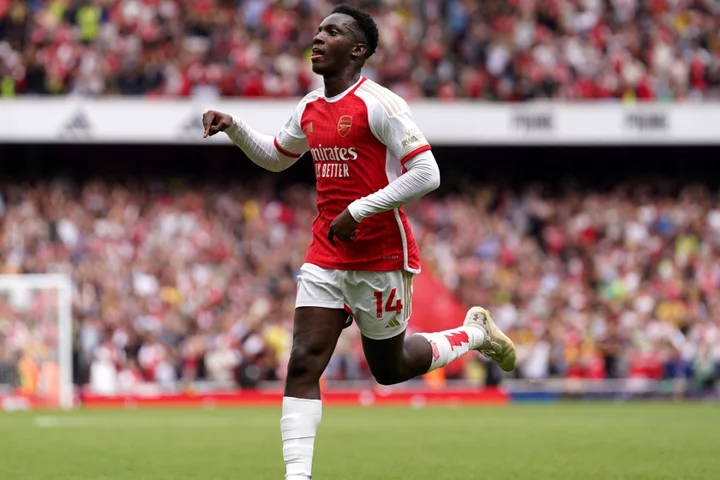
Eddie Nketiah has the game-changing trait which might make him England’s next best weapon
For Eddie Nketiah, it is a story of Arsenal royalty and Chelsea rejects. A first senior call-up for the record scorer in the history of the England Under-21s capped a fine start to the season and came after a reunion. Nketiah and Declan Rice were players who thought their dreams had died, south Londoners who were released by Chelsea as teenagers. Now they could be teammates for club and country: one is currently Arsenal’s first-choice forward, the other their £105m record signing. “It is funny how life works sometimes,” Nketiah reflected. “We have done the full 360 to be back together. I was there from the ages of nine and it came as a shock to me because I was doing well at the time. Obviously Declan was of that age group as well and had a similar experience.” Rice was the first to taste disappointment; two years later, Nketiah was deemed too small. Each could seem a costly mistake; then it was a crushing blow to them. “I think it gives you an awakening and just knowing that things can change like that: that you can lose everything you have worked for,” he said. “It gives you that extra bit of motivation and resilience when times are hard. I’m able to dig a level deeper than maybe some people can or don’t want to go into.” Arsenal helped him dig, rebuilding his confidence with the aid of their two greatest goalscorers of all time. Ian Wright became a mentor. Thierry Henry coached him in the academy. His best advice to Nketiah was motivational, not tactical. “Probably just to believe in yourself,” said the younger forward. “He came in and saw the quality I had when I was 16 or 17 and said that I just needed to believe in myself, whatever anyone else said. That is what is going to drive you, to motivate you.” They may seem simple words but the stature of the man delivering them meant they had added meaning. “He knows what he’s talking about, so it’s not a bad feeling,” Nketiah said. As a player, he may share more similarities with Wright than the World Cup winner but there is an echo of Henry whenever he dons the Arsenal kit. The No 14 shirt used to be the Frenchman’s. “Thierry wearing it has made it a lot more special,” Nketiah said. “When the number was available and offered to me, it was something that I embraced. I’m not here to try and recreate Thierry’s moments. I’m here to put my own stamp on it and create my own special memories in the shirt.” Which, at times, he has done: January’s 90th-minute winner against Manchester United was an indication of the merits of a predator. Nketiah has taken advantage of Gabriel Jesus’ absence to start three of four league games this season. And yet the shirt number can have another meaning: Nketiah has often seemed roughly the 14th man, the perennial substitute. Two-thirds of his Premier League appearances have come off the bench. When he was loaned to Leeds in 2019-20, 15 of his 17 Championship outings under Marcelo Bielsa came as a replacement. Much as Nketiah wants to start, the temptation is to wonder if his excellence as a substitute helps account for Gareth Southgate’s decision to select him: in a squad where Harry Kane’s pre-eminence among the strikers is established, England may want a game-changer in reserve. A perennial starter for his club, like Aston Villa’s Ollie Watkins, has less experience of being sent on in the dying minutes of major matches. That status as the regular reserve may account for his Under-21 scoring record: without playing enough club football, he was less likely to be promoted to the senior set-up and so ended up with 16 goals in 17 caps. Meanwhile, this month marks six years since his Arsenal debut: he has been overtaken by Bukayo Saka, two years his junior but with 28 full caps to his name. Nketiah, meanwhile, was courted by Ghana. The England call-up came at an opportune time, when Nketiah was at home, surrounded by family and a friend. “When I got the text it was surreal. I am usually a calm guy but I did lose a little bit of composure for a 10 seconds or so,” he said. “My parents were really emotional. They sacrificed a lot for me to get here and it was really nice to see that happiness and pride on their faces.” His father used to drive him to every game and booked flights to watch him on tour. His mother would stay up late, washing his kit. His sisters would finish school, come home and put him on a train to first Chelsea’s Cobham training ground and then Arsenal’s Hale End academy. The journey was not a simple or straightforward one but Nketiah is now on the brink of an England debut. Read More Eddie Nketiah ready to make “own story” for Gareth Southgate’s England in upcoming internationals Mikel Arteta hails Eddie Nketiah’s fight to play for England after first call-up England can benefit from Harry Kane’s move to Bayern Munich – Gareth Southgate
1970-01-01 08:00
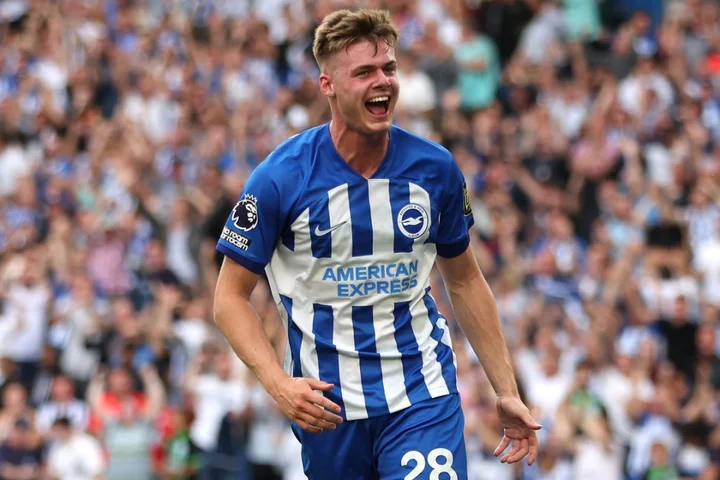
Football rumours: Manchester City leading the chase for Evan Ferguson
What the papers say Manchester City are reportedly leading a long line of suitors for Brighton striker Evan Ferguson. According to the i, any move would be viewed as future-proofing the side should Erling Haaland elect to depart the club once his contract expires in 2027. The Telegraph says Manchester United have commenced contract extension talks with defender Aaron Wan-Bissaka. The 25-year-old is in the final year of his current deal, but manager Erik ten Hag is believed to be impressed with the right-back’s progression in recent months. Reports from the Daily Mail indicate Saudi Pro League side Al-Ettifaq are still pushing to sign Everton winger Demarai Gray before the transfer deadline window closes on Thursday. Social media round-up Players to watch Kylian Mbappe: The Paris St Germain forward is open to joining Liverpool next summer, according to L’Equipe. Jorginho: Italian outlet Tutto Mercato says the 31-year-old midfielder is set to rebuff interest from Fenerbahce to stay at Arsenal. Read More Charity boss speaks out over ‘traumatic’ encounter with royal aide Ukraine war’s heaviest fight rages in east - follow live
1970-01-01 08:00
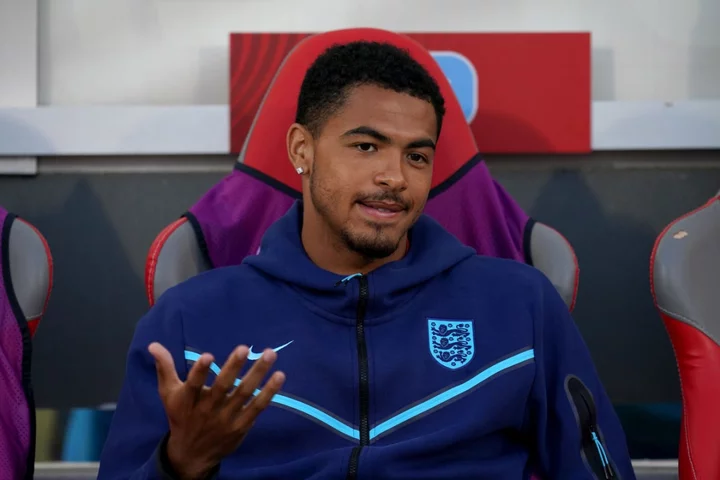
Levi Colwill savours ‘dream come true’ as England debut looms
Levi Colwill’s amazing year shows few signs of slowing as the defender looks to make his England debut and prove his worth to Gareth Southgate with Euro 2024 on the horizon. An impressive season-long loan with Brighton was followed by helping England Under-21s become European champions over the summer. Colwill returned to Chelsea and was rewarded with an improved six-year deal, before going onto make his debut in their season opener. The 20-year-old has been an ever-present under new Blues boss Mauricio Pochettino and his eye-catching displays earned a first formal England call-up. “It has been an amazing year,” Colwill said. “There have been a lot of ups and still been downs, and a load of stuff that I have had to overcome. But it’s all part of my career and you’re going to get that. “A hundred per cent it’s all worth it in the end. You’ve got to keep working hard, that’s what I have done so far but now it’s about keep going.” Colwill cited the initial lack of game time under Graham Potter and Brighton successor Roberto De Zerbi as examples of down moments he overcame. But the success that followed on the south coast saw him brought in to train with the England senior squad in June, even travelling with them for the qualifier in Malta, before heading off on Under-21s duty. “Coming and training in June was a big blessing,” Colwill said. “I enjoyed it so much and then obviously getting formally called up now is amazing. “When I got the text I called dad straight away. I think he was getting emotional, to be honest. Dream come true. “Everyone was so welcoming and it made a big difference for me. “Now I have settled in a bit, I am ready to kick on and hopefully prepare for the upcoming week.” Colwill is hoping to make his debut against Ukraine in Saturday’s Euro 2024 qualifier in Poland, or in the Hampden Park friendly against Scotland three days later. The 20-year-old allayed fitness concerns ahead of that double-header after sitting out training on Tuesday, pointing to a tough previous week and the fact he is “a young boy still growing”. Asked if making it into next summer’s Euros squad is a target, he said: “Of course. Playing for Chelsea – one of the biggest clubs in the world – it’s got to be my aim to hopefully be in the England team come the Euros. “Obviously it’s still a long time until that comes so I’ve just got to keep working hard, pushing myself and let’s see what happens next.” England have yet to mathematically seal qualification for Euro 2024, but it has long looked a case of when rather than if their place in Germany is wrapped up. The uncapped Colwill already appears to have a strong chance of being involved – an opportunity that will only be bolstered by Chelsea boss Pochettino. Adam Lallana, who the defender calls a key influence in his career, made his England debut at Southampton under the Argentinian, who his former Brighton team-mates had praised to the hilt. Colwill took that on board when committing his future to Chelsea, where he is excited to develop under a manager with a fine track record of maximising English talent. “I think the big thing for me was the first day I came in, him just putting an arm around me and showing me that he respects me as a person and also a player,” he said of Pochettino. “That allows me to work my hardest and want to play my best for him. “Just working under him in general, I know I’m going to improve. I can guarantee that because he’s such a good manager and he will push me. He won’t let me have any off days and that’s what I need. “Someone like me, if someone lets me go to sleep I might just have a good day or a bad day. But I need someone there to give me that kick up my bum and say ‘keep going’ and that’s what he does.” Read More Charity boss speaks out over ‘traumatic’ encounter with royal aide Ukraine war’s heaviest fight rages in east - follow live On this day in 2012: Teenager Jonnie Peacock wins Paralympic 100m gold in London US Open Wrap: Novak Djokovic adds yet another milestone with semi-final berth England new boy Eddie Nketiah motivated by ‘magnificent’ Thierry Henry
1970-01-01 08:00

China's Tencent to unveil AI chatbot release after Beijing clears hurdles
HONG KONG China's internet giant Tencent Holdings said that it will unveil an artificial intelligence (AI) chatbot on
1970-01-01 08:00
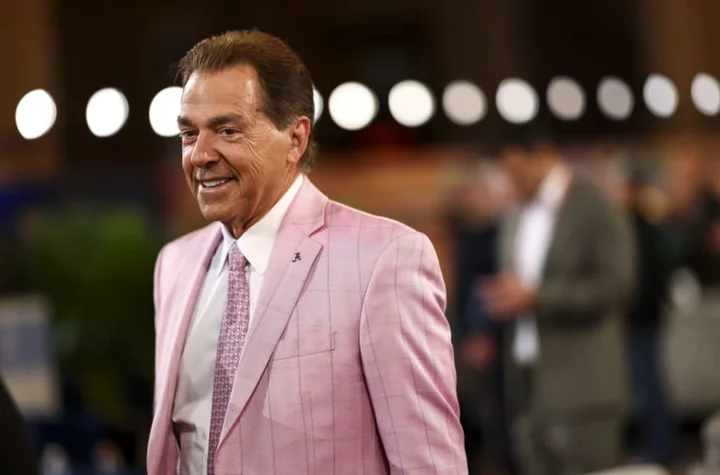
Alabama using ticket rule to go full petty with Texas fans
Alabama hosts Texas in by far the biggest college football game of Week 2 and the Crimson Tide are clearly not above playing some mindgames.
1970-01-01 08:00

Miserable CFB weekend for Spectrum customers prompts all-out battle with ESPN
ESPN has been blacked out for Spectrum users since Labor Day, making college football fans miss out. With the blackout not ending soon, what does this mean?
1970-01-01 08:00
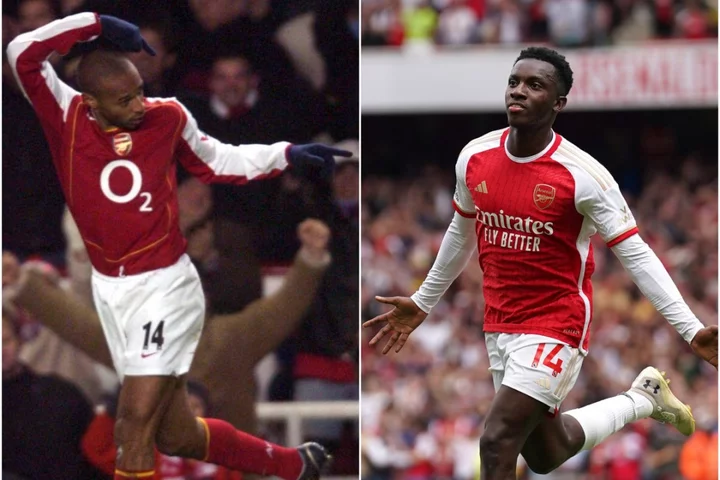
England new boy Eddie Nketiah motivated by ‘magnificent’ Thierry Henry
Eddie Nketiah hailed the “magnificent” Thierry Henry for helping him become an Arsenal striker worthy of earning a senior England call-up. The 24-year-old, who is England’s most prolific Under-21 goalscorer, was included in Gareth Southgate’s squad for the first time for the upcoming games against Ukraine and Scotland. Nketiah made his Arsenal debut six years ago and last turned out for England Under-21s in 2021. He has scored 34 goals in 136 games for the Gunners, starting with a memorable home debut off the bench against Norwich – scoring a brace to secure victory in an EFL Cup tie. Despite bursting onto the scene, Nketiah’s options were limited to the lesser cup competitions and a disappointing loan spell at Leeds in the Sky Bet Championship was seen as another setback. But, during his younger years at Arsenal – whom he joined having been released by Chelsea at the age of 14 – he was able to pick the brains of the club’s all-time record goalscorer and former captain. “Thierry has been magnificent for me,” he revealed. “I was able to be coached by him as a first-year scholar at 16, it was amazing, one of my best and most enjoyable seasons, being able to bounce ideas off him and he gave me a lot of confidence and still to this day when I see him he is still supportive and still really helpful.” Asked for the best piece of advice he received from the France World Cup winner, whose old number 14 shirt he now wears, Nketiah replied: “Probably just to believe in yourself. “He came in and saw the quality I had when I was 16 or 17 and said that I just needed to believe in myself, whatever anyone else said. That is what is going to drive you, to motivate you. That’s probably one of the best pieces of advice I’ve ever received. “I think he knows what he’s talking about, so it’s not a bad feeling!” As he fought for a starting place under Unai Emery – and now Mikel Arteta – Nketiah saw Bukayo Saka and Emile Smith Rowe emerge as the next precocious academy talent off the Hale End production line – the former now a firm favourite of Southgate. “I’m still young,” Nketiah said when asked if he was concerned he may have missed out on his own international opportunity. “Everyone’s journey is different. In this day and age everyone needs to focus on their own story and their own journey, not look at anyone else’s. Our career paths have been totally different. We’ve had different opportunities at different times. “I think I am a much better player now than I was two or three years ago. It is really nice and I am coming in at a good time and a good moment. “I feel confident and I feel ready to continue to improve – that is the thing, I’m still young and humble enough to know I am not the finished article. Nketiah could have opted to switch allegiances after Ghana – the birthplace of his parents – put feelers out to attract him to play for the Black Stars. But, once the call came, he knew he had made the right decision to stick with his guns. “I think obviously both sides were always an option,” he added. “I think naturally coming through the academy at England obviously you have the aspiration to play here and like I said, once the call-up was there and the offer was on the table it was really hard to turn down and something which I felt was a natural progression for myself at this stage. “I felt now was a good time to make that step so obviously I’m really happy to be here and proud to be here like I said, hopefully I can go on and help the team this week and get some caps.” Read More Charity boss speaks out over ‘traumatic’ encounter with royal aide Ukraine war’s heaviest fight rages in east - follow live World Cup squad ‘open for debate’ as England coach gives hope to Harry Brook I feel good – Ethan Ampadu loving life at Leeds and ready to thrive with Wales England could still use ‘magician’ Marcus Smith at full-back – Kevin Sinfield
1970-01-01 08:00
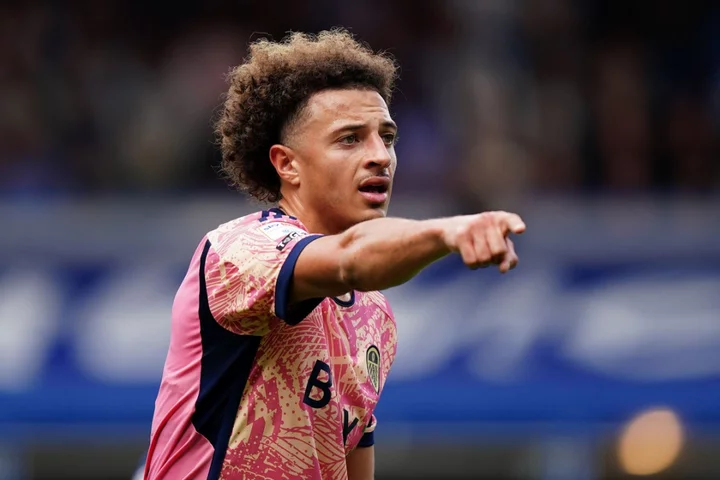
I feel good – Ethan Ampadu loving life at Leeds and ready to thrive with Wales
Ethan Ampadu believes Wales will feel the benefit of his settled life at Leeds and the end of his wanderlust. Ampadu holds no regrets over leaving Chelsea this summer and heading to Elland Road after loan spells at RB Leipzig, Sheffield United, Venezia and Spezia – at the last three clubs he suffered relegation. The 22-year-old joined Chelsea at the age of 16 in 2017 and was their longest serving player until his July departure, despite making just 12 senior appearances there in six years. “It comes down to you as an individual,” Ampadu said about his Stamford Bridge exit. “If you want to stay then you voice that opinion, but I felt it was the right time to leave.” Ampadu has become a popular figure with Leeds fans in the early weeks of the Sky Bet Championship campaign, despite an indifferent start under Daniel Farke, and is the only man to play every minute for the Yorkshire club this term. Utilised during his 44-cap Wales career either in central defence or midfield, Ampadu is relishing the opportunity to play in the middle of the park at Leeds. I've enjoyed the step I've taken and I'm excited to see what comes from it Ethan Ampadu on his Leeds move A rich history is associated with that role over the years with Billy Bremner, David Batty, Gary McAllister and Kalvin Phillips among his central-midfield predecessors at Elland Road. Ampadu said: “It’s not just the position I play but the history of the club in general, where the club belongs. “We know on the outside where everyone wants us to be and within ourselves what we need to do to get where we want to be. “You obviously feel the pressure in the club, but it’s more of an exciting pressure of knowing what you can achieve. “I feel good and I’m enjoying being settled. I gave my all in each of the loans and I was focused on developing and becoming a better player. “But maybe in the back of your mind when you know you are settled somewhere and you’re not on loan, there are little things you can improve on. “If you are playing in one position, you can work on the finer little details within that position to take you to the next level. “The results have not really gone our way so far. But our performances have given us the belief for the games coming up after the international break that we can do really well.” Wales host South Korea in a Cardiff friendly on Thursday before meeting Latvia in a crunch Euro 2024 qualifier in Riga next Monday. Rob Page’s side are in desperate need for points to book a top-two automatic qualifying spot after defeats by Armenia and Turkey in June. “We’ve had time to reflect,” said Ampadu. “Everyone knows when you see a Wales team and how we performed in those games, well, that’s not us. “Put that aside, we have to learn from it. It’s about reminding ourselves of those standards and what has got us success in the past. “I’m sure that’s the baseline for us in these games coming up.” Read More Charity boss speaks out over ‘traumatic’ encounter with royal aide Ukraine war’s heaviest fight rages in east - follow live England could still use ‘magician’ Marcus Smith at full-back – Kevin Sinfield Jonny May confronted Steve Borthwick after initial omission from England squad Novak Djokovic thrives in New York heat to beat Taylor Fritz in straight sets
1970-01-01 08:00
